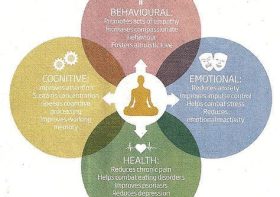10 Science-Backed Strategies for Sustainable Weight Loss

Weight loss is a common goal for many individuals, but finding a sustainable and effective approach can be challenging. With so much information available, it’s crucial to rely on science-backed strategies for long-term success. By incorporating these 10 evidence-based techniques into your weight loss journey, you can achieve your goals while prioritizing your health and well-being.
1. Set Realistic Goals
When embarking on a weight loss journey, it’s essential to set realistic goals. Aim for a steady and gradual weight loss of 1-2 pounds per week, as this has been found to be sustainable and manageable over time. Setting overly ambitious goals can lead to frustration and potential burnout.
2. Practice Mindful Eating
Mindful eating involves paying full attention to the eating experience while acknowledging hunger and satiety cues. By practicing mindfulness during meals, you can develop a healthier relationship with food, prevent overeating, and improve overall satisfaction with meals.
3. Eat a Balanced Diet
A balanced diet is essential for sustainable weight loss. Focus on consuming a variety of nutrient-dense foods, such as fruits, vegetables, lean proteins, whole grains, and healthy fats. These foods provide essential nutrients while keeping you satisfied and energized throughout the day.
4. Portion Control
Controlling portion sizes plays a significant role in weight management. Use visual cues, such as measuring cups or your hand, to gauge appropriate portion sizes. Avoid eating directly from bags or containers, as this can lead to mindless overeating.
5. Regular Physical Activity
Incorporating regular physical activity is crucial for sustainable weight loss. Aim for at least 150 minutes of moderate-intensity aerobic exercise per week, along with strength training exercises twice a week. Find activities you enjoy to make exercise a consistent and enjoyable part of your routine.
6. Get Sufficient Sleep
Adequate sleep is often overlooked but is essential for weight management. Lack of sleep can disrupt hunger and satiety hormones, leading to increased cravings and decreased calorie burning. Aim for 7-9 hours of quality sleep each night to support weight loss efforts.
7. Manage Stress Levels
High levels of stress can impact weight loss efforts. Practice stress management techniques, such as deep breathing, meditation, or engaging in hobbies, to reduce stress levels. This can help prevent emotional eating and support overall well-being.
8. Stay Hydrated
Drinking enough water is an important aspect of weight loss. Water can help increase feelings of satiety, boost metabolism, and reduce calorie intake. Aim to drink at least 8 glasses of water per day and replace sugary beverages with water to support your weight loss goals.
9. Keep a Food Journal
Keeping a food journal can be a useful tool for weight loss. By tracking your food intake, you gain insight into your eating habits, identify patterns, and become more accountable for your choices. It can also help you identify triggers for overeating and make necessary adjustments.
10. Seek Support and Accountability
Building a support system and seeking accountability can greatly enhance weight loss success. Join a weight loss group, find an accountability partner, or work with a registered dietitian or certified personal trainer. Having individuals to share your journey with can provide motivation, guidance, and encouragement.
In conclusion, sustainable weight loss involves implementing evidence-based strategies that prioritize long-term health and well-being. By setting realistic goals, practicing mindful eating, maintaining a balanced diet, controlling portions, exercising regularly, getting enough sleep, managing stress, staying hydrated, keeping a food journal, and seeking support, you can achieve your weight loss goals while promoting overall health and wellness.


